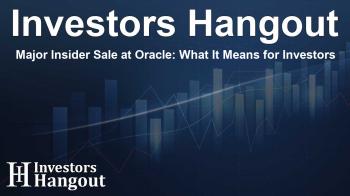Major Insider Sale at Oracle: What It Means for Investors

Understanding the Recent Insider Sale at Oracle
On a notable transaction recently disclosed, Jeffrey Berg, a Board Member at Oracle (NYSE: ORCL), made headlines by executing a significant insider sale. According to filings, Berg sold 49,365 shares, amounting to a total value of $13,971,266. Such trades often raise eyebrows and spark discussions among investors regarding potential implications for the future performance of the stock.
The Current Market Landscape for Oracle
As of the latest update, shares of Oracle saw an increase of 2.75%, bringing the trading price to $263.96. This uptick reflects the dynamic nature of the tech industry and the ongoing performance of enterprise software providers in challenging economic conditions. Investors often closely monitor stock price movements as they can be indicative of broader market trends.
What Sets Oracle Apart?
Founded in 1977, Oracle has solidified its position as a leader in enterprise applications and infrastructure solutions. The company has consistently adapted to market demands by offering a diverse range of IT deployment options that include on-premises, cloud-based, and hybrid systems. Particularly noteworthy is Oracle's pioneering role in establishing SQL-based relational databases, which are now standard in managing high-volume online transactions for many of the world's largest organizations.
Recent Financial Highlights
Revenue Trajectory: In the most recent quarter, Oracle reported a revenue growth of 12.17%. While impressive, it's crucial to recognize that this growth rate is slightly below that of its peers in the Information Technology sector, indicating mixed performance against competitors.
Key Financial Metrics:
Gross Margin: Currently at 67.28%, Oracle's gross margin raises some concerns about its cost management strategies and profitability compared to other companies in its field.
Earnings per Share (EPS): With a current EPS of 1.04, Oracle faces challenges as this figure is below the industry average, hinting at possible declines in earnings moving forward.
Debt Considerations: The company's debt-to-equity ratio stands at 4.36, significantly higher than the industry average, suggesting a reliance on borrowed capital. This elevates the financial risk profile of Oracle, which factors into investor decisions.
Valuation Metrics and Market Position
The company's valuation metrics reveal interesting insights. The Price to Earnings (P/E) ratio of 59.47 is comparatively lower than industry norms, potentially indicating that the stock might be undervalued. Similarly, a Price to Sales (P/S) ratio of 12.54 suggests the possibility of investment opportunities based on the company’s sales performance.
Market Cap Insights: Oracle’s market capitalization showcases its scale and reaffirms the market's confidence in its longevity and relevance in the tech landscape.
The Role of Insider Transactions
When assessing stock movements, investors often consider insider transactions as critical indicators. These transactions should be viewed as one element within a broader analysis framework, giving insights into the sentiment of those closely associated with the company. Insiders, defined as top executives or those possessing over ten percent of stock equity, are required to report their trades within two business days to promote transparency.
Implications for Investors
While insider selling can invoke caution among investors, it does not always suggest negative sentiment towards the company. There can be various motivations behind such decisions, including personal financial planning or market timing. Thus, understanding these transactions within the context of broader market trends and individual company performance is crucial for investors.
Frequently Asked Questions
What was the value of the stock sold by the Oracle board member?
Jeffrey Berg sold stock worth $13,971,266.
What is Oracle's current trading price?
As of the latest update, Oracle shares are trading at $263.96.
What is Oracle's recent revenue growth rate?
Oracle reported a revenue growth rate of 12.17% in the most recent quarter.
What does Oracle's debt-to-equity ratio indicate?
Oracle's debt-to-equity ratio of 4.36 indicates a higher reliance on borrowed funds, which may suggest increased financial risk.
Why are insider transactions important for investors?
Insider transactions can provide insights into the perspectives and confidence levels of those closely associated with the company, influencing investment decisions.
About The Author
Contact Logan Wright privately here. Or send an email with ATTN: Logan Wright as the subject to contact@investorshangout.com.
About Investors Hangout
Investors Hangout is a leading online stock forum for financial discussion and learning, offering a wide range of free tools and resources. It draws in traders of all levels, who exchange market knowledge, investigate trading tactics, and keep an eye on industry developments in real time. Featuring financial articles, stock message boards, quotes, charts, company profiles, and live news updates. Through cooperative learning and a wealth of informational resources, it helps users from novices creating their first portfolios to experts honing their techniques. Join Investors Hangout today: https://investorshangout.com/
The content of this article is based on factual, publicly available information and does not represent legal, financial, or investment advice. Investors Hangout does not offer financial advice, and the author is not a licensed financial advisor. Consult a qualified advisor before making any financial or investment decisions based on this article. This article should not be considered advice to purchase, sell, or hold any securities or other investments. If any of the material provided here is inaccurate, please contact us for corrections.

